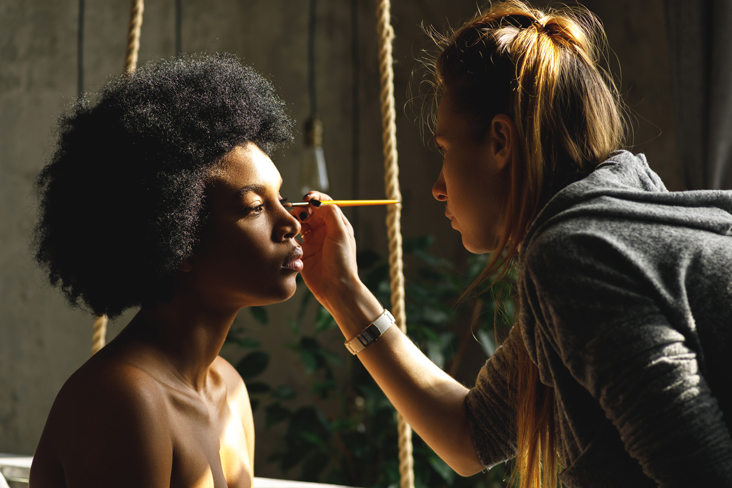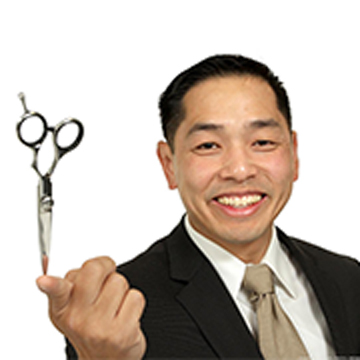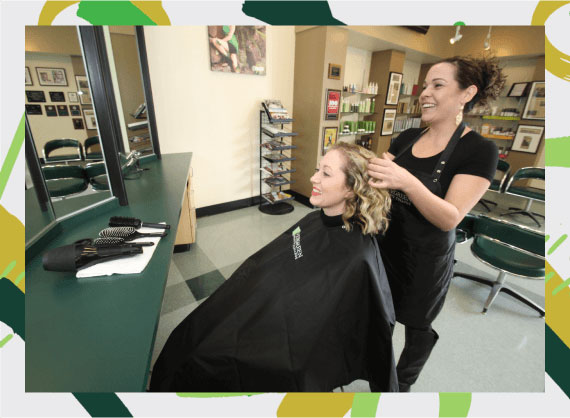The Main Differences Between a Cosmetologist and Makeup Artist

milanmarkovic78 – stock.adobe.com
The distinctive difference between a makeup artist and a cosmetologist is that a makeup artist is a specialist. They focus their skills on one area: makeup artistry. Cosmetologists and makeup artists work in the beauty industry, and there is a lot of overlap in their education and training. Typically, hairstylists will study cosmetology and makeup artists can study makeup artistry in cosmetology school or study with an esthetics program. In this article, we’ll examine some key differences between the two professions.
Key roles
A professional make-up artist works with cosmetics to enhance people’s appearance. Make-up artists are experts in their craft. In contrast, a cosmetologist is considered a generalist with more wide-reaching beauty-related skills. A cosmetologist’s work isn’t limited to cosmetics. They also have knowledge and experience with hair styling, hair cutting, hair care, nail care, hair removal, and skin care. Many cosmetology students go on to become hair stylists or nail technicians.
Educational requirements
While there is no absolute way to become a make-up artist, there are a few paths each aspiring make-up artist can take to thrive in the beauty industry. Requirements vary from state to state.
We recommend earning a license to gain a deeper understanding of your craft. Earning a beauty license will also be more attractive to employers. Employers will see that you have work experience in the real world and a background in beauty from an accredited school. Depending on the curriculum and the state requirements, students have two options––they can enroll in cosmetology or an esthetics program.
Cosmetology
A cosmetology license requires between 1,200 and 1,800 hours of cosmetology training. In Washington state, students need 1,600 hours of training. Some of the coursework students can expect to learn in cosmetology school include:
- Styling hair and cutting
- Nail treatment
- Skin treatments
- Make-up application
- Special effects make-up
A wide range of topics is covered in cosmetology, including consulting clients, developing your portfolio, and a basic understanding of chemistry and color theory. In a cosmetology program, you will learn everything you need to become a successful cosmetologist. Sometimes, make-up artists may not require a formal education if they have enough industry experience.
Esthetics
An esthetics program only requires 600 credit hours. That’s a lot less than a cosmetology course. Esthetics focuses on skincare. Students will greatly understand skin analysis and how the skin evolves, prompted by premature aging, natural aging, and hormonal changes.
They will also learn to administer various facials and skin treatments, including more invasive chemical peels. Many make-up artists opt to study esthetics due to their association with skin. While make-up can be transformative, luminous skin starts with a good skincare routine, and understanding formulations and what ingredients can do will prove to be helpful to make-up artists.
Understanding beauty formulas influences how you treat the makeup application of each client with varying skin types and issues.
On more mature skin, a make-up artist might opt out of using a full-coverage foundation and use an oil-based moisturizer with concealer instead. Make-up artists with private clients are very familiar with their client’s skin issues and can help guide them on products that will work best on their skin type.

blackday- stock.adobe.com
Job opportunities
Traditional job opportunities in makeup artistry usually fall under an event or sales associate. When you get hired to work at a wedding event, be prepared to answer many questions and get a lot of directions. Wedding looks can vary depending on whether it’s an evening, daytime, or outdoor wedding. There are less conventional makeup artistry jobs, like working as a theatrical makeup artist that a cosmetology program will prime students for. According to Go Banking Rates, successful theatrical makeup artists can earn $134,750 annually in 2023 working in the television industry, film, or theater.
Attending cosmetology school will benefit makeup artists because they learn to consult clients and get hands-on training with real clients. The roles of a professional makeup artist span numerous industries and a wide array of services, including:
- The entertainment industry (movies and TV)
- Special effects makeup
- Theater
- Fashion industry, including runway and editorials
- Make-up counter sales associates
- Beauty-related managerial positions
- Beauty buyers
- Cosmetic manufacturers
- Personal make-up artists
Cosmetologists are also eligible to work in the same occupations as make-up artists. Since cosmetologists deal with more than just makeup, they could work in beauty centers, spas, health clubs, and more. Since cosmetologists have undergone formal training and licensing, they are more likely to be paid than makeup artists.
Specialization vs. generalization for makeup artists and cosmetologists
There are pros and cons in any beauty field. Typically, if you specialize in anything, your chances of landing a job as a hairstylist, nail tech, esthetician, and makeup artist will increase. The demand for makeup artists, especially since the advent of social media, is on the rise.
With specialization, earning more and working in exciting careers is possible. Makeup artistry is a specialization, and there are many paths to explore as a makeup artist. Fashion makeup artists are unshackled by convention. Special effects makeup artists get to see their work on TV and in movies. It’s an endlessly creative labor of love where you’ll get to work with other artists.
It’s not uncommon for creative-minded people to have many creative outlets, so if you like doing nails and hair styling, then with a cosmetologist license, you’ll have the opportunity to pursue different roles or dabble in many beauty roles. The pros of cosmetology are getting to mix things up and work in a broader beauty field.
Other differences between cosmetology and makeup artistry
When opening a business, like a salon or a spa, licensed cosmetologists will have an edge with more operational experience in each facet of the services offered. Most cosmetology programs teach business practices and study multiple beauty treatments.
Another consideration is that most beauty-related businesses require a licensed cosmetologist to ensure safety standards are followed with each service. If make-up artists do not study cosmetology, they will benefit from working under the supervision of a cosmetologist to gain additional experience.
Evergreen Beauty College can provide you with the necessary education to become the beauty professional you’ve always dreamed you could be. If beauty is your passion, we can help you transform that desire into a fulfilling and exciting career. Contact us for more information on how you can get started today! Schedule an appointment to tour our campus and meet and speak with our instructors. You’ll get the chance to see other students in action at the campus salon while instructors supervise them. Evergreen Beauty College offers esthetics and cosmetology programs.
FAQ – What’s the Difference Between a Cosmetologist and a Makeup Artist?
Does cosmetology mean makeup artistry?
Cosmetology involves applying makeup, skin, nail, and hair styling. Makeup artistry is exclusively the application of makeup.
What is the official name for being a makeup artist?
Officially, applying makeup in any medium is called a makeup artist. If you work in prosthetics makeup, it is still called a makeup artist. However, to distinguish between a makeup artist and someone who works in molding and prosthetic sculpting, it’s called a makeup effects artist.
Where does the term cosmetology come from?
A cosmetologist is an expert in cosmetics who adorns another person. We refer to cosmetology and cosmetologists as generalists who understand how to perform various beauty treatments, including hair, nails, skin treatment, and hair removal.





I am interested in your beauty college how much does your tuition cost and how long is thy school classes do you offer online ?
Rebecca, I will ask our Admission Team to reach out to via email 🙂